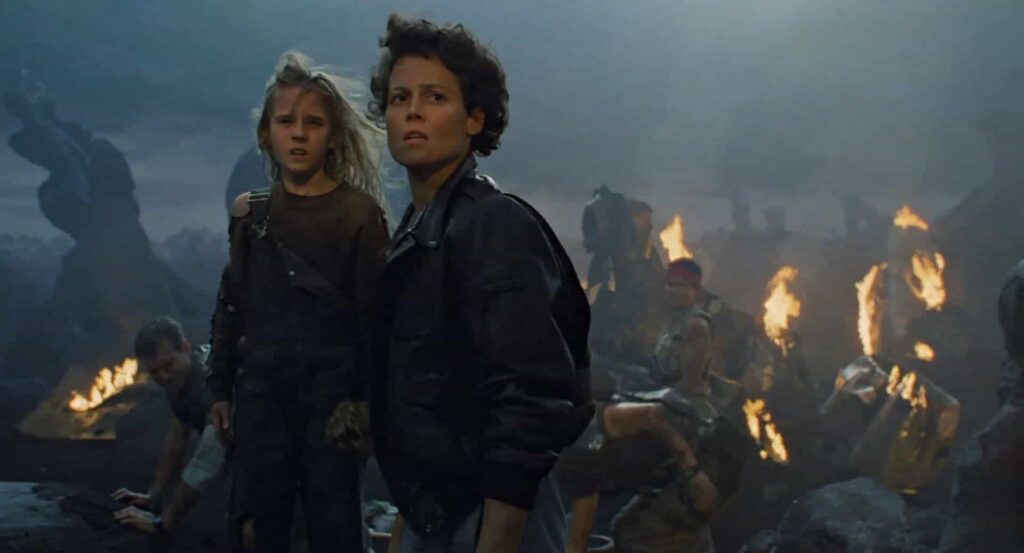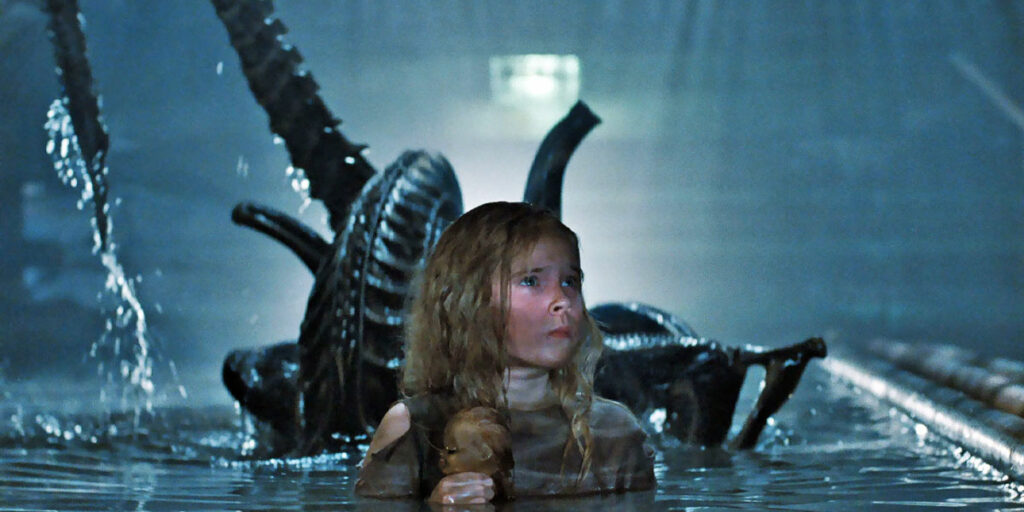Aliens, James Cameron’s bombastic and surprisingly emotional 1986 sequel, dissects motherhood and trauma in exhilarating and terrifying fashion.
The best blockbusters not only deliver exhilarating action sequences, but they are also able to provide their audience with a message. James Cameron’s Aliens, the 1986 sequel to Ridley Scott’s Alien (1979), holds up as one of the best science fiction/action films of all time due to its thrilling effects, compelling characters, and messaging regarding motherhood and trauma. The film’s thematic core pushes its boundaries past the typical genre schlock, attempting – and succeeding – to give its audience something universal.
The Alien series, at its core, is about future humanity’s fight with a group of extraterrestrial lifeforms, the xenomorphs. Also at the crux of the film franchise are potent ideas about the effects of greed, often portrayed through the Weyland-Yutani corporation, which seeks financial profit from harvesting the alien lifeforms. The first film, Alien, depicts a group of humans’ first encounter with a xenomorph and the disasterous consequences that follow.
Aliens begins 57 years after the events of the first film, though, through the eyes of the main character, Ellen Ripley (Sigourney Weaver), almost no time has passed. Ripley was in stasis, being the only survivor of the Nostromoship crew after a xenomorph slaughtered the rest. This sequel finds Ripley surrounded by a new cast of characters who attempt to combat the alien creatures. Whereas the first film features a horror atmosphere, Cameron opted to ramp up the action for Aliens. The result is an exciting, still often terrifying feature that entertains while bringing a certain thematic richness that elevates Aliens above the typical genre film.

Through the film, and specifically through Ripley, Cameron explores two main ideas: the effects of trauma and the solace of motherhood. Ripley begins the film with mental and emotional scars accumulated in the first film, after seeing the rest of her crew killed by the xenomorph. She is seen having nightmares and hallucinations about the alien attack, even experiencing, in a dream, a replication of the famous “chest bursting” scene from the first film, where a xenomorph is “born” by bursting through the chest of a human host.
Ripley’s trauma looms over the film’s first half, as she remembers the horrible atrocities the creatures are capable of. Her experience also hinders her trust for her new crew, at least at first. She especially dislikes the android Bishop (Lance Henriksen), after having been betrayed by an android in the first film. She also clashes with other members, like Cpl. Dwayne Hicks (Michael Biehn) and Pvt. William Hudson (Bill Paxton). Part of her initial animosity towards the group is their unwillingness to take the threat of the aliens seriously, despite Ripley’s warnings. Her mental state and associated trauma manifest themselves in various ways throughout the film.
Only through her role as mentor/mother to the young Newt (Carrie Henn) is Ripley able to escape her past. The crew finds Newt while searching for a human colony on the planet LV-426, the home of the xenomorphs and the “facehuggers,” the parasitic lifeforms that are the second stage of the alien’s life cycle. Ripley’s demeanor instantaneously shifts to that of a nurturing mother figure to Newt. Weaver does not get enough credit for her performance, being able to switch seamlessly between confident, no-nonsense leader to the kind, caring parental personality towards Newt. Aliens plays with the idea defining femininity in the modern age, painting Ripley as the ideal representative. She fights, she leads, she puts people (mostly the men) in their place, while also caring for and mentoring the next generation.
This idea culminates with the famous “get away from her, you b*tch!” line in the film’s closing minutes. When the xenomorph queen boards the crew’s ship and attacks Newt, Ripley, in a true audience applause moment, emerges in one of the ship’s cargo-loading exosuits (reminiscent of the battle suits in Avatar) and fights the creature. She triumphs over the alien queen by sending it out to space through the ship’s airlock. The line, delivered right before the fight, puts the film’s key message on display: Women in society can not only be nurtures, but they can also be fighters. Cameron plays with the concept of gender roles throughout this film in other ways, as well, and challenges some of the “accepted” ideas that have formed societal thinking throughout history.
Cameron weaves these complex themes and ideas into Aliens via his escalated storytelling. He is a master of building up to the action, while still making the exposition, introduction of characters, and other non-action-packed elements of the story just as compelling. It is easy to forget that an over an hour passes before the first big action set piece in Aliens. Cameron uses the time wisely by building up Ripley’s emotional arc and introducing the audience to key characters, each whom represent different facets of the modern view of masculinity and femininity. Once the action scenes begin, they pack a much more visceral and emotional punch, because of the film’s rising tension.
In Aliens, fans may recognize several aesthetic aspects that would become popular in other Cameron films (specifically his two Avatar films). While the overall technical aspects of the film are impressive, they never become the focus at the detriment of the story. Cameron does not feel the constant need to impress the audience. He tells the story effectively and throws in some incredible visual moments that serve the story’s purpose. Certain shots in this film are technically magnificent and still terrifying to this day, including the shot of the aliens crawling through the ceiling and the shot of the xenomorph emerging from the water behind a terrified Newt. The technical wizardry on Cameron’s part never outshines the story he’s telling, which is why the film continues to remain relevant.
One could watch Aliens without discovering a deeper meaning or without marveling at the technical achievements and still walk away thinking about how great the film is. Many fans consider the film a classic simply due to its blending of sci-fi and horror elements. However, the film seems to have secured its place in the cinematic canon not only because of its great genre beats, but also because of the thematic weight Cameron was able to bring to this franchise. While the first Alien film certainly introduced some interesting ideas, Aliens continues that thread, making both films classics. Aliens succeeds on so many levels, but it’s the film’s willingness to explore universal ideas that has made it one of the most enduring and endearing sci-fi films of all time.
Aliens (1986) is now available to watch on digital & on demand.

